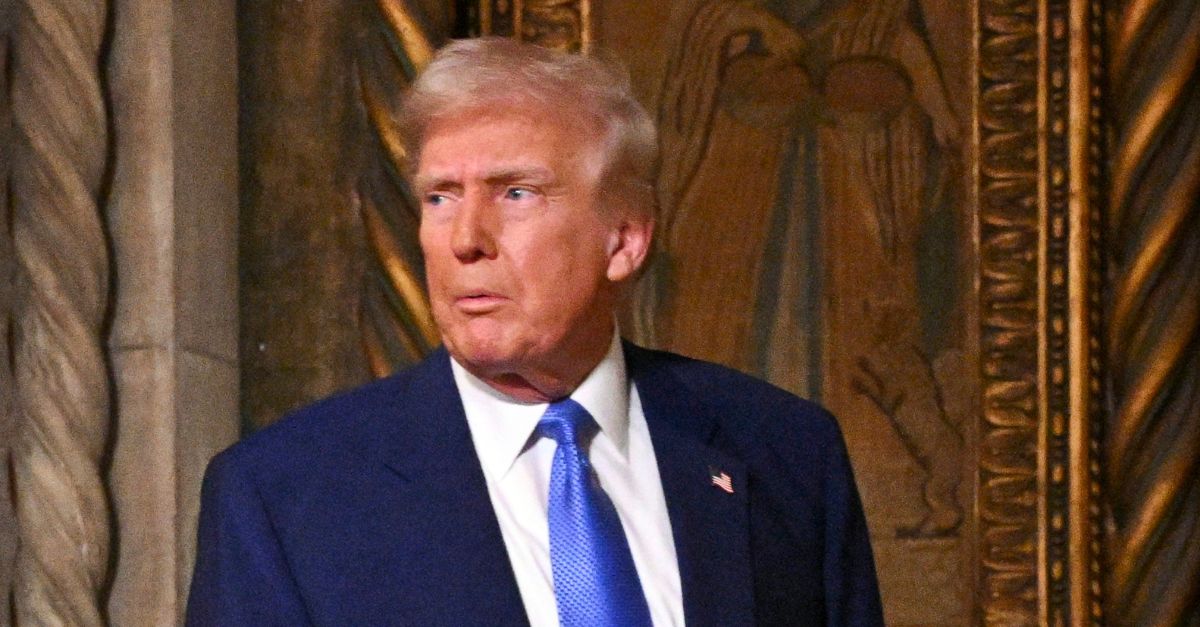Share this @internewscast.com

President Donald Trump departs after speaking at Mar-a-Lago in Palm Beach, Fla., Tuesday, Feb. 18, 2025 (Pool via AP).
On Monday, the Trump administration invoked the state secret privilege to resist providing a federal judge with additional information regarding several planeloads of Venezuelan migrants deported under an 18th-century wartime law, potentially breaching the court’s directive.
In a 10-page submission featuring statements from key administration officials such as Attorney General Pam Bondi, Secretary of State Marco Rubio, and Homeland Security Secretary Kristi Noem, the government conveyed to U.S. District Judge James E. Boasberg its intention not to release details about the deportation flights carried out under the Alien Enemies Act of 1798.
“The Court possesses all necessary information to address the compliance issues at hand. Additional intrusions on the Executive Branch threaten significant and unwarranted separation-of-powers implications concerning diplomatic and national security matters, which are beyond the Court’s expertise,” the filing asserts. “Therefore, the state secrets privilege prevents further requests for information irrelevant to this case, and tomorrow, the government intends to demonstrate to the Court that there is no foundation for any claim of noncompliance with any binding order.”
The privilege allows the government to withhold information from the court if such information could be detrimental to national security. Boasberg has been privy to such information on numerous occasions, as he previously presided over the nation’s national security court.
The controversy stems from a March 15 lawsuit filed by the ACLU on behalf of five pseudonymous Venezuelan men seeking to bar President Donald Trump from going through with his stated plan to deport alleged members of the Venezuelan gang Tren de Aragua (TdA) using the obscure measure. Boasberg swiftly granted the plaintiffs’ request, barring the government from invoking the AEA as the sole authority for removal and calling a same-day hearing.
During the hearing, Justice Department attorneys told the court that two planes had already departed carrying individuals to El Salvador. Boasberg at about 6:45 p.m. on Saturday, March 15, issued an oral order that directed the government to turn around any planes carrying individuals being removed pursuant to the president’s proclamation
Boasberg’s brief written order, issued at about 7:25 p.m. that evening, did not include the same directive ordering the planes to return to the country. Nonetheless, the administration allegedly allowed the planes to land and the individuals were handed over to the custody of a foreign government.
Boasberg last week continued to seek additional information from the government as to whether his order was intentionally ignored, but was repeatedly stonewalled by the government, calling one of their explanatory filings “woefully insufficient.”
The Justice Department has vacillated on whether it understood that Boasberg’s verbal argument was binding, arguing in filings that the DOJ believed the written order and not the oral order was binding. However, the DOJ’s lead attorney in the case has since conceded that he understood the oral order as binding.
The filings last week took on an increasingly indignant tone, with Boasberg calling one response “intemperate and disrespectful.” That tone appeared to carry over into Monday’s filing.
“No more information is needed to resolve any legal issue in this case,” the DOJ wrote. “Whether the planes carried one TdA terrorist or a thousand or whether the planes made one stop or ten simply has no bearing on any relevant legal issue. The need for additional information here is not merely ‘dubious,’ or ‘trivial,’ it is non-existent. The Executive Branch violated no valid order through its actions, and the Court has all it needs to evaluate compliance. Accordingly, the Court’s factual inquiry should end.”
Boasberg has previously appeared skeptical of the administration’s potential use of the state secrets privilege, noting that the flight information was publicly available and footage of the detainees landing in El Salvador was posted on social media by the country’s president and then amplified by Rubio.
In his declaration, Rubio insisted that providing Boasberg with the requested information would place U.S. foreign relations and national security in jeopardy.
“It is critical to bear in mind that removal operations can be (as they are here) counterterrorism operations. If foreign partners believed that any relevant details could be revealed to third parties, those foreign partners would be less likely to work with the United States in the future,” the secretary of state wrote. “That impairs the foreign relations and diplomatic capabilities of the United States and threatens significant harm to the national security of the United States.”
A three-judge appellate panel on Monday afternoon heard oral arguments on the DOJ’s request to have Boasberg’s order lifted. During the hearing, one of the judge’s said that Nazi’s in custody during World War II “got better treatment” than the Venezuelan migrants, another indicated he believed the case should have been brought in Texas, not Washington, and the third did not ask any questions.
Trump and his allies have demanded the impeachment of Boasberg, which earned a rare rebuke from Chief Justice John Roberts, who reminded the president that “impeachment is not an appropriate response to disagreement concerning a judicial decision.”
Love true crime? Sign up for our newsletter, The Law&Crime Docket, to get the latest real-life crime stories delivered right to your inbox.
















